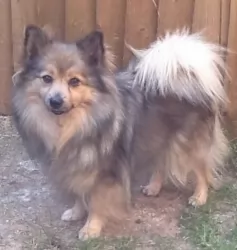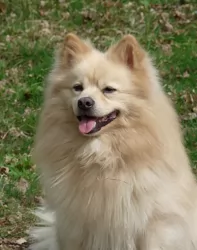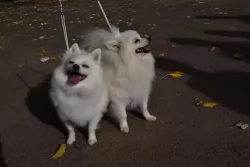 MyDogBreeds
MyDogBreeds German Spitz (Mittel) is originated from Germany but Basque Shepherd is originated from Spain. German Spitz (Mittel) may grow 23 cm / 9 inches shorter than Basque Shepherd. German Spitz (Mittel) may weigh 18 kg / 39 pounds lesser than Basque Shepherd. Both German Spitz (Mittel) and Basque Shepherd has same life span. German Spitz (Mittel) may have less litter size than Basque Shepherd. Both German Spitz (Mittel) and Basque Shepherd requires Moderate maintenance.
German Spitz (Mittel) is originated from Germany but Basque Shepherd is originated from Spain. German Spitz (Mittel) may grow 23 cm / 9 inches shorter than Basque Shepherd. German Spitz (Mittel) may weigh 18 kg / 39 pounds lesser than Basque Shepherd. Both German Spitz (Mittel) and Basque Shepherd has same life span. German Spitz (Mittel) may have less litter size than Basque Shepherd. Both German Spitz (Mittel) and Basque Shepherd requires Moderate maintenance.
 Originating in Germany, the German Spitz Mittel is an alert, vigilant dog and it is these qualities that made him sought after for working on farms.
Originating in Germany, the German Spitz Mittel is an alert, vigilant dog and it is these qualities that made him sought after for working on farms.
He is no new breed and is the 3rd largest of the five German Spitz varieties. It is believed that the German Spitz descended from the Northern sled and herding dogs which arrived with the Vikings into Europe. When you do research you see that the dogs are mentioned in German literature which dates way back to to 1450 already.
 The Basque Shepherd is one of the oldest dog breeds. With this Spanish dog, you’ll find paintings dating back 12,000 years ago. The Basque Shepherd is known as a landrace breed, which means the dog hasn’t gone through the same selective breeding programs as what other breeds have. Landrace breeds have more variations in appearance and temperament than regular breeds.
The Basque Shepherd is one of the oldest dog breeds. With this Spanish dog, you’ll find paintings dating back 12,000 years ago. The Basque Shepherd is known as a landrace breed, which means the dog hasn’t gone through the same selective breeding programs as what other breeds have. Landrace breeds have more variations in appearance and temperament than regular breeds.
The Basque Shepherd has 2 distinct varieties, the Gorbeiakoa and the Iletsua. The smooth-haired Gorbeiakoa has a softer coat that is fairly short while the rougher-haired Iletsua has a lighter coloured coat, and unlike the Gorbeiakoa, the ears are not typically erect.
Even though this is an ancient breed of dog, only the Royal Canine Society of Spain recognizes the breed with the two varieties, and in January 1996, the two breeds - Iletsua and Gorbeikoa – were recognized.
 The German Spitz Mittel is similar in looks to the other sizes of German Spitz. The Mittel is a medium sized dog and stands between 30 and 38cm in height and weighs between 7 and 11kg. You’ll find him in solid colors such as tan, liver, white, fawn, black or a mix of these colors.
The German Spitz Mittel is similar in looks to the other sizes of German Spitz. The Mittel is a medium sized dog and stands between 30 and 38cm in height and weighs between 7 and 11kg. You’ll find him in solid colors such as tan, liver, white, fawn, black or a mix of these colors.
He has a soft woolly undercoat and a long outercoat with a mane-like ruff at the neck. He has a fairly long muzzle, dark eyes, sharp erect ears and a bushy tail which curls over his back.
Affectionate, faithful, and always happy by nature, the German Spitz Mittel is a family companion that wants to be part of everything his human family is up to. He makes a good watchdog. He is alert and has a distrust of strangers.
He gets on well with children in the home and he can also live in peace with other dogs. Because he is an intelligent dog, you won’t have much trouble with training- and socializing him, although he will require a firm, consistent owner and trainer.
Training and socialization are important as there are always some important commands such as sit, stay, come and lie down that you will want him to respond to immediately.
 The Basque Shepherd is a strong, well proportioned dog with brown eyes and medium sized ears, which sometimes have folds. This medium-to-large dog has a beautiful fawn coat of medium-length hair that can be straight or slightly wavy. He has a long feathery tail that will wag readily when he sees his owner. You’ll find other colors for the Basque Shepherd shared between the two varieties - a yellow orange or copper coat with other shades being red, blue and black. His hair is shorter on the head and he doesn’t battle with hair over the eyes.
The Basque Shepherd is a strong, well proportioned dog with brown eyes and medium sized ears, which sometimes have folds. This medium-to-large dog has a beautiful fawn coat of medium-length hair that can be straight or slightly wavy. He has a long feathery tail that will wag readily when he sees his owner. You’ll find other colors for the Basque Shepherd shared between the two varieties - a yellow orange or copper coat with other shades being red, blue and black. His hair is shorter on the head and he doesn’t battle with hair over the eyes.
The Basque Shepherd is a highly intelligent dog and also very energetic. Of the two different kinds of Basque Shepherd, it is the Gorbeiakoa which is the more outgoing. The dogs will require a firm owner and they thrive on the discipline when it is combined with lots of with lots of exercise and activities.
The Basque Shepherd is generally friendly with people, if not a little reserved with strangers. He gets on well with children and other pets in the home, although socialization and training will be necessary to bring out their best.
 People who have owned a German Spitz Mittel are delighted with him, saying that he is such an easy-going, happy dog. He is social and thrives on the interaction he has with his human family.
People who have owned a German Spitz Mittel are delighted with him, saying that he is such an easy-going, happy dog. He is social and thrives on the interaction he has with his human family.
He won’t do well if you simply put him in your backyard and forget about him, using him merely as a watchdog.
The German Spitz Mittel dog is one dog that definitely lives up to the title of man’s best friend. He is social, happy, loving, loyal, playful, entertaining and smart too, and when you treat him the way he deserves, you’ve got the most awesome friend.
 The dog is well suited to being a family pet, loving to spend time with family, being a people-oriented breed. He gets on well with children as well as other pets in the home, but can be reserved with strangers.
The dog is well suited to being a family pet, loving to spend time with family, being a people-oriented breed. He gets on well with children as well as other pets in the home, but can be reserved with strangers.
He doesn’t have an aggressive nature, and yet he does what it takes to protect his beloved human family.
He is full of energy, hardy and tough. He loves his human family and wants to be included in all their activities. He is energetic though and as a responsible dog owner, you want to make sure that your Basque Shepherd has enough space to run.
 German Spitz dogs are healthy, and when you shower him with love and attention and good food, you can expect to have him around for up to 15 years of age.
German Spitz dogs are healthy, and when you shower him with love and attention and good food, you can expect to have him around for up to 15 years of age.
Of course, as with any other healthy dog breeds, there are always one or two common dog illnesses that your dog may get. These include hip dysplasia and eye diseases. If you notice symptoms that indicate possible joint issues with your pet, get him to the vet immediately.
Patellar Luxation for instance occurs when your dog’s kneecap is dislocated. It is more common in toy breeds like the German Spitz. It can be painful for your pet and lead to lameness. If your dog has problems with his hip, it can actually force the patella out of its groove, which is a secondary condition.
 Because this is an ancient breed, the Basque Shepherd doesn’t have to contend with genetic health problems such as more modern breeds. Just like other dogs though, he could be prone to certain conditions such as hip dysplasia, eye problems, ear infections and cancer. As a larger breed, he may also be prone to bloat.
Because this is an ancient breed, the Basque Shepherd doesn’t have to contend with genetic health problems such as more modern breeds. Just like other dogs though, he could be prone to certain conditions such as hip dysplasia, eye problems, ear infections and cancer. As a larger breed, he may also be prone to bloat.
Breeds with floppy ears, such as the Basque Shepherd will be more prone to developing ear infections. To prevent infection, keep his ears clean and dry. If you’re unsure, the vet can guide you how- and what to do.
This is a disease which is common to other dog breeds too and not just the Basque Shepherd. This condition affects the hip joints and can result in chronic pain for the dog and also lameness. Checking your dog’s weight is important and the pain can be managed with medication.
 You can help reduce loose hairs with your German Spitz by brushing his thick coat twice a week. It’s a good time to also inspect your dog for ticks and fleas.
You can help reduce loose hairs with your German Spitz by brushing his thick coat twice a week. It’s a good time to also inspect your dog for ticks and fleas.
Your German Spitz Mittel isn’t the most active dog, but he will still need regular exercise. Going on a walk is good for both you and him. He is a mentally sharp dog too and these walks keep him both physically- and mentally fit. He also loves ball games.
Every dog deserves the best food, and if you feed your German Spitz Mittel with a commercially manufactured dog food, make sure its one of the top quality ones. You want to avoid foods packed with preservatives, colorants and fillers. You want dog foods with minerals and vitamins with high protein and ingredients such as Omega 3 and 6 to promote health skin.
There are also some dog foods which have ingredients in them such as polyphosphates. Ingredients like this keep your dog’s teeth clean.
Try and also give him some cooked rice, vegetables and chicken mixed into his kibble from time to time as well as raw meat. He should never be without fresh, cool water.
 This is a medium to large breed dog and he should therefore be fed a high quality food which has been formulated for medium to large breeds. Because he is a herding dog, you might want to also look at an active-dog or working-breed formula to supply him with that much needed energy.
This is a medium to large breed dog and he should therefore be fed a high quality food which has been formulated for medium to large breeds. Because he is a herding dog, you might want to also look at an active-dog or working-breed formula to supply him with that much needed energy.
The Basque Shepherd’s coat is lush and long with either straight or wavy hair. Regular brush at least twice a week will maintain the coat, get rid of loose hair and prevent fleas.
The Basque Shepherd is an intelligent breed that will respond well to socialization and training. He is a breed that loves sports too because of this very high energy levels. You need to be careful with the Basquae Shepherd around small children, not because he is aggressive in any way, but because he is highly active, and his exuberance and boisterous antics could see him unintentionally knocking over small children.